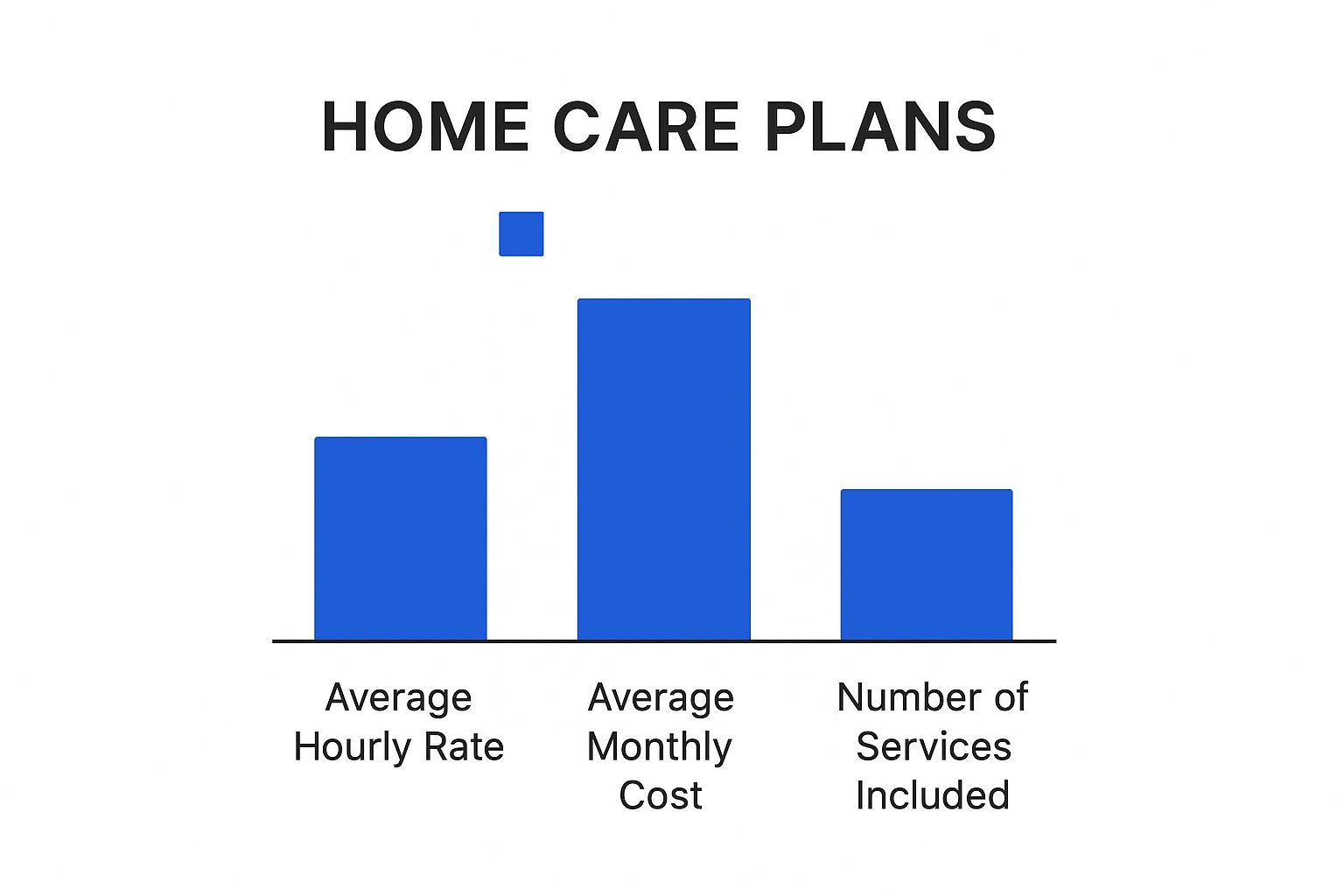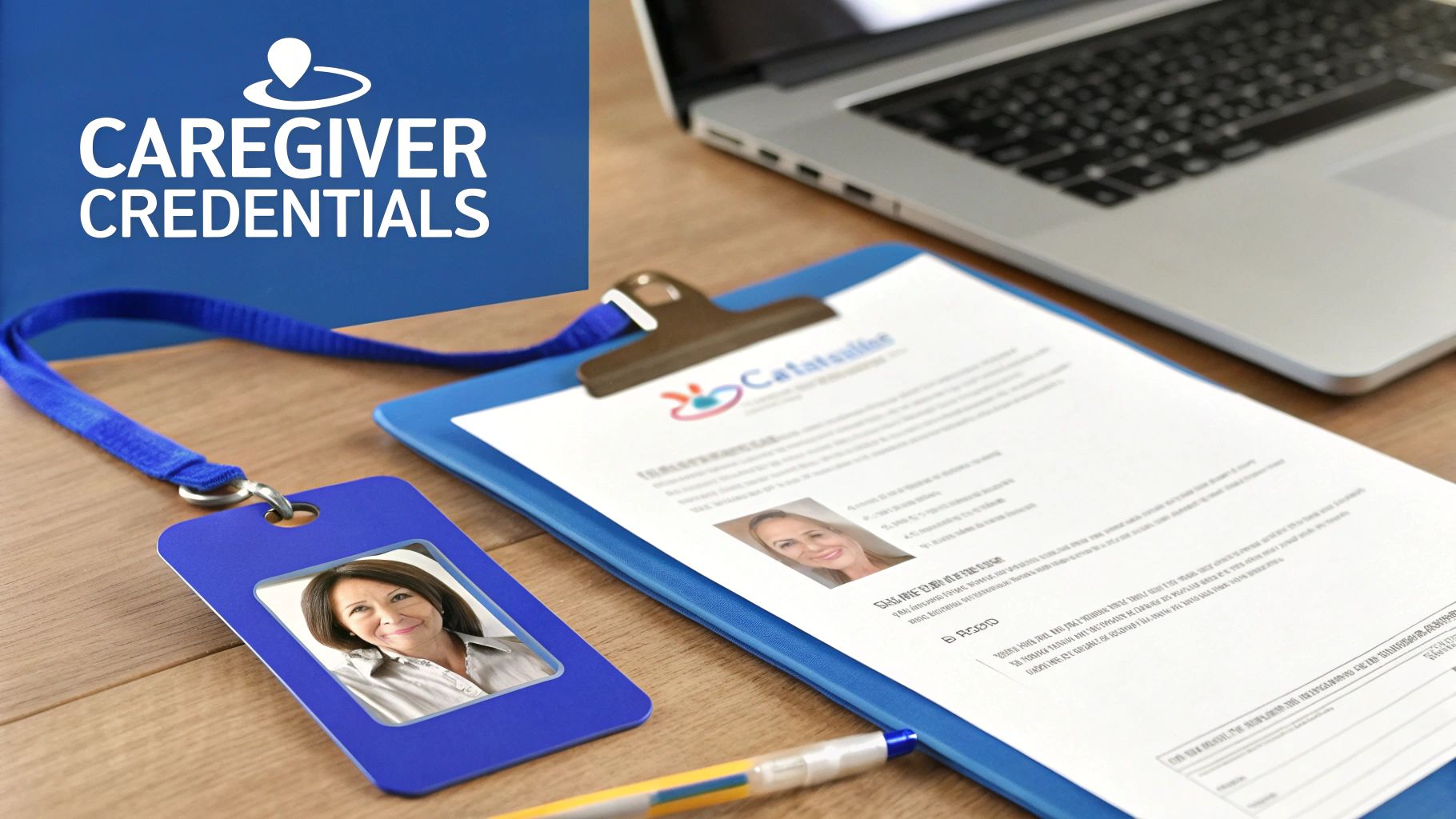Choosing a home care agency is a deeply personal process. You're not just checking boxes; you're looking for a partner to trust with a loved one's well-being. The goal is to find an agency that is not only licensed and insured but also shares your family's values on compassionate, respectful care. This ensures safety, of course, but it also protects your loved one's quality of life.
Finding the Right Home Care Agency
Deciding to bring a caregiver into your loved one's home is a major step, one that often comes with a mix of relief and anxiety. You're not just hiring a service—you're inviting someone into your family's private life. The great news is that because so many seniors want to age in place, the home care industry has grown significantly.
This growth has made the entire field more competitive, which is a huge advantage for you. It means you have more choices, can expect higher quality, and will find a greater emphasis on professional, person-centered care. Your first step is simply getting a feel for the options available today.
The Modern Home Care Landscape
If you looked for home care a decade ago, your options would have been far more limited. Today, the sector is robust and expanding at a remarkable pace. This isn't just a trend; it's a market reality that gives you more power as you search. The U.S. home care market hit a value of $151.7 billion in 2024 and is projected to keep growing. This boom is fueled by a clear preference for staying at home over moving to a facility, and it gives you more leverage than ever. You can find more insights about this growing market on ibisworld.com.
What does this economic strength mean for your family? It translates into real, tangible benefits:
- More Qualified Caregivers: To stay competitive, agencies have to invest in better training and wages to attract top-tier talent.
- Improved Service Offerings: Many companies now provide specialized care for conditions like dementia, diabetes, or post-surgery recovery.
- Greater Accountability: In a crowded market, a good reputation is everything. Agencies are more motivated than ever to provide excellent service.
The best agencies are not only compassionate but also professionally managed and financially sound. A healthy, growing agency has the resources to invest in its caregivers, which often means lower turnover and more consistent, reliable care for your loved one.
What to Look For First
As you start your search, it helps to have a quick checklist to weed out the non-starters. Think of this as your first pass, a way to quickly identify agencies that are built on a solid, professional foundation. You’re looking for signals of stability, professionalism, and a genuine commitment to both clients and employees.
After all, an agency that invests in its staff is an agency that invests in quality care. Before you get into the nitty-gritty of interviews, looking for these core markers will help you focus your time and energy on the most promising candidates right from the beginning.
Here’s a simple framework to help you organize that initial screening.
Initial Agency Evaluation Checklist
This table summarizes the most important criteria to consider as you begin your search for a home care agency.
| Evaluation Area | Why It Matters for Your Family | What to Look For Immediately |
|---|---|---|
| Licensing & Insurance | This is your non-negotiable safety net. It protects you from liability and ensures the agency meets state standards. | A valid state license (CHHCA License #HC0276600), proof of liability insurance, and worker's compensation. |
| Caregiver Screening | The quality of care depends entirely on the quality of the caregiver. You need to know they are trustworthy and skilled. | A detailed screening process that includes background checks, reference checks, and verification of certifications. |
| Staff Training & Support | Ongoing training means caregivers are up-to-date on best practices. Good support reduces burnout and turnover. | A clear commitment to continuing education, specialized training (e.g., dementia care), and regular supervision. |
| Reputation & Reviews | What do other families say? Online reviews and testimonials offer unfiltered insight into the client experience. | Check Google, Yelp, and industry-specific sites. Look for patterns in feedback—both positive and negative. |
Using this checklist to guide your initial phone calls and website visits will quickly tell you which agencies are serious contenders worth a deeper look.
Figuring Out Your Family’s Specific Care Needs

Before you even think about picking up the phone to call an agency, you need a crystal-clear picture of the support your family actually needs. I've seen it time and time again—families dive into the search without a plan. It’s a lot like walking into a grocery store hungry and without a list. You end up overwhelmed, spending more than you need to, and you might even walk out without the one thing you really needed.
Taking the time to create a thorough needs assessment is probably the single most important thing you can do upfront. It makes sure you find an agency that’s a genuine fit, helps you control costs by only paying for necessary services, and, most importantly, prevents crucial care gaps from being missed.
Understanding the Different Levels of Care
Not all home care is created equal. Most agencies group their services into different levels, and knowing the difference is the first step in figuring out what you're looking for.
-
Companion Care: This is all about emotional support and keeping someone company. A caregiver might play cards, go on walks, offer friendly conversation, or help with light housekeeping and meals. It's a great fit for seniors who are still fairly independent but are starting to feel isolated.
-
Personal Care: Here, we're talking about hands-on help with what we call Activities of Daily Living (ADLs). This means an aide helps with things like bathing, getting dressed, grooming, using the restroom, and moving around safely. If your loved one needs physical support to get through their day, this is the level of care you're looking at.
-
Skilled Nursing Care: This is for medical needs that go beyond daily assistance. This care is provided by a Registered Nurse (RN) or a Licensed Practical Nurse (LPN) and can include things like wound care, administering injections, or managing complicated medical equipment.
Getting this distinction right is crucial because it directly affects the caregiver's qualifications and, of course, the price tag.
Making a Detailed Checklist of Your Needs
Once you have a general idea of the care level, it's time to get specific. Documenting every little detail will empower you to have much more direct and productive conversations with potential agencies. Your goal is to paint a complete picture of what a typical day looks like for your loved one.
A detailed needs assessment is your roadmap. It doesn't just guide your search—it becomes the foundation of the official care plan the agency creates, ensuring everyone is on the same page from day one.
As you build out your list, think about these areas:
- Daily Routines: What time do they usually wake up and go to bed? When do they like to eat their meals?
- Mobility: Do they use a walker or a wheelchair? Can they get out of bed and into a chair on their own?
- Medication Management: How many medications are they taking? Is it just simple reminders, or do they need physical help opening bottles and taking the right dose?
- Specific Health Conditions: Make notes on any special requirements for conditions like dementia, diabetes, or heart issues. For example, managing dementia might require specific ways of communicating or gentle redirection strategies.
The demand for this kind of specialized care is climbing fast. In fact, the U.S. home healthcare market was valued at $100.95 billion in 2024 and is expected to hit $176.30 billion by 2032, largely because of an aging population dealing with chronic conditions. You can discover more about these home healthcare trends over at Fortune Business Insights. This growth is good news—it means more agencies can handle complex needs, but you have to be able to state those needs clearly. For a little more context, check out our guide on NJ Caregiving's approach to personalized support.
How to Vet and Shortlist Potential Agencies

Once you have a clear idea of your family’s needs, it’s time to start the real work: vetting the agencies on your list. This goes way beyond just glancing at a website. You need to dig in, verify their credentials, and get a feel for how they operate. The goal is to narrow down the possibilities until you have a handful of truly qualified, trustworthy partners.
The very first thing to check is licensing and insurance. This isn't just a "nice-to-have"; it's an absolute must. Any reputable agency must be licensed by the State of New Jersey and carry full insurance. This protects your family from liability if there’s an accident or injury on the job. Don't be shy—ask for their license number and to see a copy of their insurance certificates.
Reading Between the Lines of Reviews
Online reviews are a fantastic resource, but you have to know how to read them. Don’t just get hung up on the star rating. Look for patterns. Are you seeing multiple families praise the agency for its great communication and reliability? That’s a huge plus.
On the other hand, if you notice several people mentioning last-minute caregiver cancellations or confusion over billing, treat that as a serious red flag. Also, pay attention to how the agency responds to negative feedback. A professional, helpful response shows they take accountability. A defensive or non-existent one? That tells you they might be difficult to deal with when a problem inevitably pops up.
A single bad review can happen to even the best agencies. A pattern of similar complaints, however, usually points to a deeper, systemic issue you'll want to steer clear of.
The Importance of Calling References
Reviews give you a glimpse, but speaking directly with other families provides a much clearer picture. Always ask a potential agency for at least two or three references from current or recent clients. If they hesitate or refuse, that’s a major warning sign.
When you get someone on the phone, be ready with specific questions:
- How does the agency handle unexpected situations, like when a caregiver has to call out sick?
- How responsive is your main contact person at the office?
- Do you feel the caregiver they matched with your loved one was a good fit?
These questions dig deeper than a simple "are you happy?" and give you real insight into how the agency performs under pressure. Whatever you do, don't skip this step. It’s one of the most powerful vetting tools you have.
Understanding Their Hiring and Training Standards
At the end of the day, an agency is only as good as its caregivers. That’s why you need to get a clear understanding of their hiring and training process. A quality agency won't cut corners here. They will have a rigorous screening process that includes comprehensive background checks (both state and national), drug screenings, and a thorough verification of all certifications.
Also, ask about their ongoing training. Do they provide specialized training for caregivers working with clients who have dementia or Parkinson's? An agency that invests in continuing education for its staff is showing a real commitment to a higher standard of care. This dedication is often what separates an okay agency from a great one. You can view the NJ Caregiving team's approach to compassionate support to see what this commitment looks like.
With approximately 15 million Americans receiving in-home care services, the demand is massive. The industry is projected to grow at a CAGR of 7.96% through 2030, which means competition is fierce. This actually works in your favor—it pushes the best agencies to maintain exceptional standards to stand out. You can discover more home care statistics and insights to better understand this landscape. Take advantage of this and be selective.
Mastering the In-Person Consultation
Whether it’s in your living room or over a video call, the in-person consultation is where you get a real feel for an agency. This is your chance to look past the glossy brochures and website promises. Think of it less like a sales pitch and more like a two-way interview—you're seeing if they have what it takes to become a trusted care partner for your family.
A great agency won't just talk at you; they'll listen. Their representative should be more interested in hearing your story and understanding your loved one's specific needs than in reciting a pre-packaged script. This meeting is all about seeing if their values and approach truly align with yours.
Key Questions That Reveal True Character
Walking into this meeting with a list of questions is a must. It keeps you focused on what matters and gives you a consistent way to compare different agencies later. Don't hesitate to ask the tough questions. How they answer will tell you everything you need to know about their company culture and commitment to quality care.
Here are a few essential questions to get the conversation started:
- Caregiver Matching: "Could you walk me through your exact process for matching a caregiver to my mother? What do you look at besides just basic skills and availability?"
- Communication: "If a concern comes up, who is our direct point of contact? What's your protocol for keeping the family in the loop, and how often can we expect to hear from you?"
- Emergency Planning: "What happens if our regular caregiver gets sick or has an emergency? How quickly can you get a qualified backup caregiver to our home?"
- Scheduling Flexibility: "Our needs might change. How does your agency handle requests to adjust the schedule or change the number of care hours?"
These questions demand more than a simple "yes" or "no." They require the agency to explain their real-world processes, giving you a clear window into how they operate when it counts.
Dissecting the Personalized Care Plan
The creation of the personalized care plan is a make-or-break moment in the consultation. A top-notch agency will build this plan with you, not just hand you a pre-filled template.
You need to be an active voice in this conversation. Make it clear that you want to discuss how the plan will be reviewed and updated over time, because a loved one's needs are rarely static. Ask who gets to provide input—you, your loved one, and even their doctor should be part of the equation. This is your best opportunity to see if they're offering truly customized support or just a one-size-fits-all service.
The consultation is where you see if an agency’s actions match their words. Pay attention to how they listen, the thoughtfulness of their answers, and how willing they are to collaborate on the care plan. That tells you more than any marketing material ever will.
This infographic can help you break down some of the common cost and service metrics as you compare different care plans.

As you can see, a higher hourly rate doesn’t automatically mean a higher total monthly cost if fewer hours are needed. The key is making sure the services included in the plan line up perfectly with your family's specific needs.
Navigating Home Care Costs and Contracts

Let's talk about the financial side of things. This is often where families feel the most stress, but it doesn’t have to be so confusing. A trustworthy agency will always be upfront and transparent, making sure you feel confident before you sign anything. Your main goal here is simple: get a crystal-clear, detailed breakdown of every possible cost.
The first conversation should be about their payment model. Most agencies have a few different options, and the best fit really depends on your family’s specific needs and schedule.
- Hourly Rates: This is the most common setup. You pay a set rate for each hour of care provided, which is perfect for families needing flexible schedules or part-time support.
- Package Pricing: Some agencies bundle services for a flat weekly or monthly fee. If you know you'll need a consistent, high number of care hours, this can be a more budget-friendly route.
- Live-In or 24-Hour Care: This is a more involved pricing structure for when you need round-the-clock support. It's vital to ask how rates are figured out, because "live-in" (where the caregiver sleeps at night) and "24-hour" (with multiple caregivers in shifts) are two very different services with different costs.
A critical part of learning how to choose a home care agency is demanding financial clarity. If an agency is vague about its rates or unwilling to put everything in writing, that's a significant red flag. You should never feel pressured to commit without seeing a full fee schedule.
Decoding the Service Agreement
After you've sorted out the pricing, it's time to dive into the service agreement or contract. Think of this legal document as your source of truth—it should spell out every single detail of the arrangement. A good contract is there to protect both you and the agency.
The agreement has to clearly define the scope of services. It should list out the specific tasks the caregiver will handle, from personal care duties to light housekeeping. Vague phrases like "general assistance" just won't cut it. The contract should also lay out the agency's policies.
Look for clear clauses covering:
- Cancellation: What’s the rule if you need to cancel a shift? How much notice do you have to give to avoid a charge?
- Caregiver Changes: What happens if the assigned caregiver isn't the right fit? The contract must explain the process for finding a new match.
- Rate Increases: How and when can the agency raise its prices? It should clearly state how much notice you'll get.
Understanding Your Payment Options
Finally, it’s important to know exactly how you’ll be paying for these services. While many families pay out-of-pocket, there are several other resources that might be available to you. A reputable agency can usually help you navigate these options.
For example, many long-term care insurance policies cover in-home care services. Veterans might also be eligible for benefits through the Department of Veterans Affairs that can help cover the costs. The key is to bring these possibilities up with the agency from the very beginning. A quality provider, like the team at NJ Caregiving, will know the ins and outs of these programs and can help you with the necessary paperwork. Don’t be shy about asking for their guidance—they should be ready to help you explore every possible payment avenue.
Common Questions About Choosing Home Care
Even when you've done your homework, you're bound to have some specific questions pop up as you get closer to choosing a home care agency. That’s perfectly normal. Getting straight answers to these common concerns can give you the confidence you need to make a final decision without any second-guessing.
Here are some of the most frequent questions we hear from families just like yours.
Agency Caregiver Versus Independent Hire
One of the first hurdles many families face is deciding whether to hire a caregiver through an agency or find an independent person on their own. At first glance, hiring someone directly might seem like the cheaper route. But it’s important to remember that this makes you the employer.
That means you’re on the hook for everything: managing payroll, withholding taxes, handling liability insurance, and sorting out workers' compensation. It's a lot to take on.
Choosing a licensed and insured home care agency transfers all that risk and administrative burden away from your family. The agency takes care of legal compliance, payroll, and insurance, giving you peace of mind and letting you focus solely on your loved one’s well-being.
A professional agency handles the entire employment process, from intensive background checks to ongoing training. This ensures the person coming into your home isn't just trustworthy, but also highly skilled. This level of oversight is a critical part of learning how to choose a home care agency that truly protects your family.
The Caregiver Matching Process
It's natural to wonder how an agency finds the right person for your loved one. A good agency doesn't just send the next person on the schedule. They have a thoughtful, detailed matching process designed to create a great fit from day one.
This process starts with the information gathered during the initial in-home assessment and carefully considers:
- Required Skills: Does the caregiver have the specific experience needed for personal care, dementia support, or simple companionship?
- Personality and Temperament: They'll try to match your loved one with a caregiver who has a compatible personality—maybe that’s someone quiet and calm, or perhaps someone more upbeat and talkative.
- Shared Interests: When possible, agencies even look for shared hobbies or interests to help build a stronger, more natural bond.
Most quality agencies will also arrange a "meet-and-greet" before the first shift. This gives you and your loved one a chance to meet the caregiver and see how everyone feels. If it isn't the right connection, a good agency won't hesitate to find a better match from their team.
Handling Caregiver Absences
What happens if your regular caregiver gets sick, goes on vacation, or has a family emergency? This is where using an agency really shows its value. They have a full team of qualified, pre-screened caregivers ready to provide backup when needed.
If your primary caregiver is unavailable, the agency is responsible for arranging a suitable replacement. This ensures your loved one's care continues without interruption and they always have the support they need. When you interview agencies, make sure to ask them to walk you through their specific backup care policy so you know exactly what to expect.
At NJ Caregiving, we believe that providing exceptional care starts with answering every question you have with honesty and clarity. If you're looking for a partner who prioritizes communication, compassion, and reliability, we invite you to learn more about our services. Find out how we can support your family's needs at NJ Caregiving.


